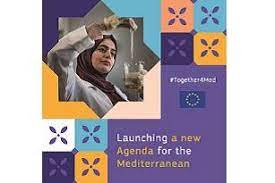In 2021, the EU launched its new Agenda for the Mediterranean. It may become a missed opportunity if the EU does not put human rights and rule of law first.
While Ukraine has been high on the EU agenda since the year blossomed, a series of visits by high-level EU officials to the South Mediterranean have taken place, with the first visit paid by EU Commission President von der Leyen to Morocco on 9 February, and trips by Commissioner Várhelyi, in charge of the neighbourhood – East and South – to Morocco on 9-10 March, Israel/Palestine on 23-24 March, before greeting Tunisia’s authorities on 29 March.
On all these occasions, the EU representatives did not miss the opportunity to refer to the EU Agenda for the Mediterranean, a comprehensive programme for EU’s regional and bilateral relations with Southern Mediterranean countries, released on 9 February 2021.
A patchwork of mostly uncontroversial projects
The agenda primarily aims to provide support for digital and green ‘transitions’, although the first priority deals with human development, good governance and the rule of law. This stated priority also undoubtedly aims to prevent, or at least limit, corruption and misuse of EU funds by partner countries, and to enhance the predictability of bilateral relations, both politically and in terms of trade, economic and energy exchanges. Needless to say, the issue of migration remains at the heart of this partnership, as the EU is obsessed with “managing” migrants.
When referring to the EU Agenda, Commissioner Várhelyi repeatedly mentioned the Economic and Investment Plan that accompanies the more political agenda – like an appendix to a core text, or a decoration ribbon to make the whole package look attractive. This “staff working document” lists a series of small to medium-sized projects, providing a patchwork of mostly uncontroversial supportive measures. Without clear reference to the lack of respect for human rights, crackdown on civil society, and authoritarian drifts in the region, that ‘appendix’ mantra could be considered a syndrome: the packaging made more important than the centrepiece.
“The Economic and Investment Plan: an appendix to a core text, or a decoration ribbon to make the whole package look attractive.”
This EU Agenda for the Mediterranean is supposed to “inform the preparation of bilateral political frameworks,” which can be Joint documents, Partnership priorities or equivalent, “establishing jointly agreed political and economic reform agendas and related implementing tools”. What’s the state of play? If there is not much to expect neither from the priorities with Jordan and Lebanon, which will probably resemble those adopted previously, nor from those with Egypt since the EU is reluctant to raise human rights issues, it is feared that those with Algeria will wipe out any human rights concerns in a context where natural gas may be used as a bargaining chip by Algeria – with Russia threatening to shut off its gas taps, and the EU trying to find alternative suppliers.
Tunisia is an interesting case study of this bleak picture. During his one-day visit to Tunisia, EU Commissioner Várhelyi praised Tunisia’s “new field of reforms that is coming,” and President Kais Saied’s roadmap “with all these dates that have already been announced and all these decision points that are very important to maintain”. He also underlined that it was imperative “to keep all principles related to the rule of law” and depicted judicial independence as “another priority and absolute principle”. He then announced the EU was ready to mobilise around 4 billion EUR for investments, to bring back ‘growth & jobs’, work and economic and social growth, along with a series of financial envelops to support Agenda-related reforms and alleviate the food crisis in Tunisia and the region.
A slap in the EU’s face
The following day, on 30 March, Tunisia’s President dissolved the Parliament, an unconstitutional move that does not really match Várhelyi’s call for “a profound reform that will give you even stronger institutions, even more capable of delivering results,” “with a functioning Parliament that is able to take all necessary decisions”. Even worse, on 6 April, President Kais Saied declared that he would not call for early legislative elections while announcing his decision to unilaterally change the voting system for the elections set for December, with citizens voting for individuals rather than lists. And on 22 April, he seized control of the Independent High Authority for Elections (ISIE), prompting a timid and belated response from the EU.
In February 2021, after the publication of the EU Agenda, EuroMed Rights wondered whether this agenda would be more than a speed dating. With renewed Partnership priorities yet to see light and authoritarian moves looking like slaps in the EU’s face, this agenda risks becoming a missed appointment if the EU does not genuinely put human rights, good governance and the rule of law first.
By Vincent Forest, Outreach Director & Head of Brussels Office.

